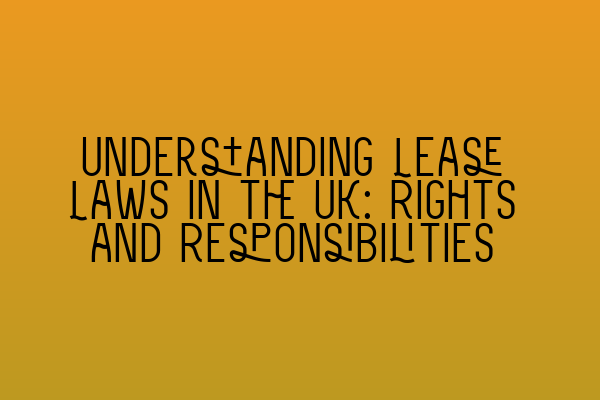As a solicitor specializing in property law, I understand how important it is for tenants and landlords to have a clear understanding of lease laws in the UK. Leases are legal documents that outline the rights and responsibilities of both parties, and it’s crucial to be well-informed to avoid any potential disputes or misunderstandings.
What is a Lease?
A lease is a contract between a landlord and a tenant that grants the tenant the right to occupy a property for a specified period, typically for several months or years. It sets out the terms and conditions of the tenancy, including the agreed rent, the duration of the lease, and the obligations of both parties.
Understanding lease laws is essential for both landlords and tenants. Landlords must know their rights and responsibilities to ensure they comply with the law, while tenants need to understand their entitlements and obligations to protect their interests.
Rights and Responsibilities of Landlords
Landlords have several key rights and responsibilities when it comes to lease agreements:
- Obligation to Provide a Safe and Habitable Property: Landlords are responsible for ensuring that the property meets certain minimum standards, such as having a functioning heating system, clean water supply, and adequate sanitation facilities.
- Rent Collection: Landlords have the right to collect rent from their tenants as agreed upon in the lease. They can also increase the rent after the agreed-upon term, but there are specific rules and procedures that must be followed.
- Repairs and Maintenance: Landlords are generally responsible for maintaining and repairing the structure and exterior of the property. This includes ensuring that all electrical, plumbing, and heating systems are in good working order.
- Notice to Terminate the Lease: Landlords have the right to terminate a lease agreement, but they must provide reasonable notice to the tenant. The length of the notice period depends on the type of tenancy and the reason for termination.
These are just a few examples of the rights and responsibilities that landlords have under UK lease laws. It’s crucial for landlords to familiarize themselves with all applicable laws and regulations to ensure compliance and avoid any legal issues.
Rights and Responsibilities of Tenants
Tenants also have certain rights and responsibilities that they need to be aware of:
- Obligation to Pay Rent: Tenants have a responsibility to pay rent on time as agreed upon in the lease. Failure to do so may result in eviction.
- Right to a Safe and Habitable Property: Tenants have the right to live in a property that meets certain minimum standards. If the property is in need of repairs that affect its habitability, tenants should notify the landlord and request that the necessary repairs be made.
- Right to Quiet Enjoyment: Tenants have the right to enjoy the property without interference from the landlord. This means that the landlord cannot enter the property without proper notice or harass the tenant in any way.
- Right to Terminate the Lease: Tenants have the right to terminate the lease by giving the landlord proper notice. The length of the notice period depends on the type of tenancy and the terms of the lease agreement.
It’s important for tenants to familiarize themselves with their rights and responsibilities to protect their interests and ensure a positive tenancy experience.
Seeking Legal Advice
If you’re a landlord or tenant facing a lease dispute or have any concerns regarding your rights and responsibilities, it’s advisable to seek legal advice from a qualified property solicitor. They can provide you with tailored guidance and help you navigate through the complexities of lease laws in the UK.
At SQE Property Law & Land Law, our team of experienced solicitors can provide you with expert assistance and representation in lease-related matters. Contact us today at [insert contact information] to schedule a consultation.
For further resources on understanding lease laws and preparing for SQE exams, check out these related articles:
